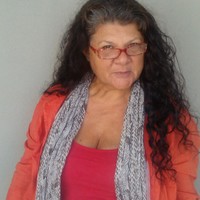Pat Torres
Batchelor Institute of Indigenous Tertiary Education, Higher Degree Research, Department Member
- Pat Mamanyjun Torres is a Djugun, Yawuru, Garajarri, Jabirr-Jabirr, Nyul-Nyul, Bard woman of the West Kimberley regio... morePat Mamanyjun Torres is a Djugun, Yawuru, Garajarri, Jabirr-Jabirr, Nyul-Nyul, Bard woman of the West Kimberley region interested in Australian Kimberley Indigenous Knowledge Systems and Indigenous Cultural Systems and History. She is passionate about Australia's First People's Oral Histories, the continuation of her families cultural knowledge and its practices, and the Australian Native Food industry.edit
Despite the devastation of British invasion and colonisation of Australia which resulted in widespread destruction to Australia's First People and their cultures, the Djugun, Ngumbarl and Jabirr-Jabirr people of the West Kimberley region... more
Despite the devastation of British invasion and colonisation of Australia which resulted in widespread destruction to Australia's First People and their cultures, the Djugun, Ngumbarl and Jabirr-Jabirr people of the West Kimberley region of Australia have survived and its present day descendants maintain they have a continuing connection to land, family and the cultural, economic and spiritual landscape of their Country. They assert that their responsibilities to their ancestral places remain strong despite continuing disruptions to their cultural and physical landscape. This connection is now being examined and authenticated through the Native Title legal process as Ngumbarl, Jabirr-Jabirr (aka Djabera-Djabera), Nyul-Nyul and Nimanburr face the State’s regime of the ‘onus of proof’. This pre-mentioned native title group also face off against the Goolarabooloo people, who are of Nykina, Yawuru and Bard descent and have been a historical user of Djugun, Ngumbarl and Jabirr-Jabirr people’s lands. This study seeks to examine the following question, ‘What are the Sustaining Ideals of Land, Language, Family, Indigenous Knowledge and Resource Management wisdom found within the Djugun families of the Dampier Peninsular region? This study maintains that complex socio-historical and political processes inform the present-day relationships between government, industry, Australia’s ‘Settler-Society’, recent immigrants and Australia’s First People’s societies and the sharing of wisdom within the natural and cultural resources management (NCRM) field. Recent interest in Aboriginal wisdom found within the traditional ecological knowledge (TEK) field of study has created an opportunity to improve contested relationships within Australian Aboriginal and non-Aboriginal relationships. However, negative attitudes, social, economic and political exclusions still prevail despite Indigenous people’s willingness to share their knowledge and cultural experiences in order to create reconciliation between First Peoples, ‘settler-Australian’ and new immigrants. The following words by Indigenous writer, Ambelin Kwaymullina is self-explanatory, ‘To be Indigenous is to be a traveller of strange worlds and a negotiator of alien spaces that reflect little or nothing of ourselves’. (Kwaymullina, 2015). Therefore, a discussion about the ‘sustaining ideals’ and its wisdom within Djugun Aboriginal society in Australian contexts necessitates an examination of the contested historical relationships and an exposing of the raw detail of contact.
Research Interests:
The author reflects on important points arising from the prehistory conference for both archaeologists and Aborigines. There is a need for consultations with Aboriginal people and their communities and Aboriginal people in matters... more
The author reflects on important points arising from the prehistory conference for both archaeologists and Aborigines. There is a need for consultations with Aboriginal people and their communities and Aboriginal people in matters involving them. Information available from the excavations can be used by Aboriginals to firmly establish their long history in Australia. Archeological work needs to be conducted for the benefit of the Aboriginal community and not the sole benefit of the researcher. Researchers must be accountable to the communities they wish to work with or to study. All this will ensure that the Aboriginals and researchers are mutually benefitted.
Research Interests:
Research Interests:
Research Interests:
Research Interests:
Research Interests:
Ngaji gurrijin? Yangki juyu mabungan? Ngayu mabu! Bagu walybula nyamangan miya. Walybula jarraiyl yagayima bulanjin nyambagun miya. Mabu gulybulan nyamagun ngaanka jarraiyl. Ugallgarda jarraiyl ngaanka. Hello! How are you all feeling! Are... more
Ngaji gurrijin? Yangki juyu mabungan? Ngayu mabu! Bagu walybula nyamangan miya. Walybula jarraiyl yagayima bulanjin nyambagun miya. Mabu gulybulan nyamagun ngaanka jarraiyl. Ugallgarda jarraiyl ngaanka. Hello! How are you all feeling! Are you feeling good? I'm good. You have all come to this place. It is good of you all to come here to this place. It is good of you all to come here to talk to us, and listen to our talk...
Research Interests:
The author reflects on important points arising from the prehistory conference for both archaeologists and Aborigines. There is a need for consultations with Aboriginal people and their communities and Aboriginal people in matters... more
The author reflects on important points arising from the prehistory conference for both archaeologists and Aborigines. There is a need for consultations with Aboriginal people and their communities and Aboriginal people in matters involving them. Information available from the excavations can be used by Aboriginals to firmly establish their long history in Australia. Archeological work needs to be conducted for the benefit of the Aboriginal community and not the sole benefit of the researcher. Researchers must be accountable to the communities they wish to work with or to study. All this will ensure that the Aboriginals and researchers are mutually benefitted.
I feel privileged to be asked to speak on the country of the Arrente people and I acknowledge to the Arrente Elders and traditional owners that this is their land and I thank them for having me here. I am honoured to be here and I thank... more
I feel privileged to be asked to speak on the country of the Arrente people and I acknowledge to the Arrente Elders and traditional owners that this is their land and I thank them for having me here. I am honoured to be here and I thank the organisers of the conference for asking me to speak.
